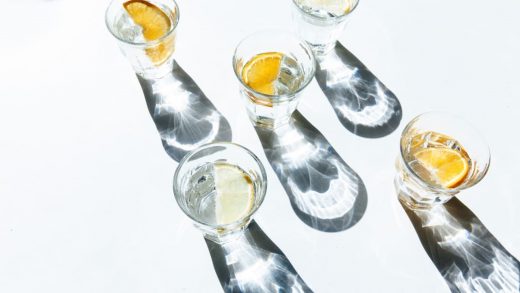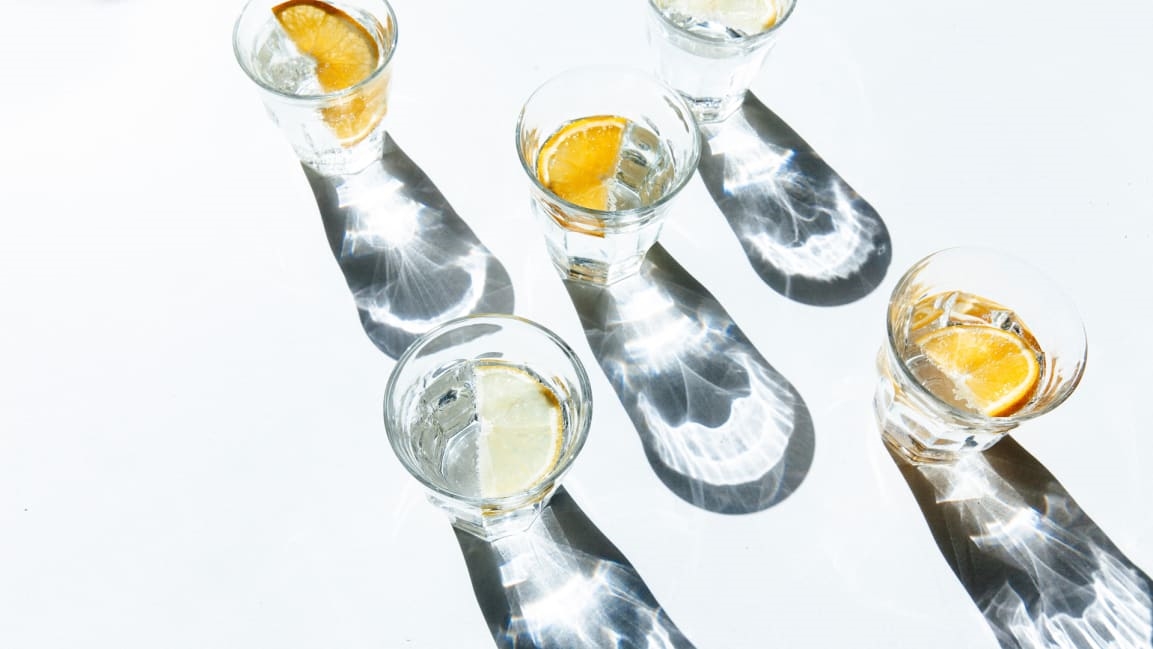This is what happened when I stopped drinking for a month
My relationship with alcohol started in college when I discovered Miller Lite helped me come out of my shell. I kept drinking throughout my 20s, and my beverage of choice eventually evolved from beer to wine. At some point, though, my weekend treat turned into a near nightly habit. Since I work from home, a glass (or two) became my way of clocking out. It also helped me fall asleep at night. I told myself I deserved it. And red wine has health benefits . . . right?
Then I heard about the “sober curious” movement, a trend where people reevaluate their relationship with alcohol, giving it up for a period of time. I loved wine, but I didn’t love the urge I felt to pour a glass every night. I’d attempted a Dry January in the past but didn’t stick with it for more than a few days. And while wine helped me fall asleep, it didn’t keep me there. About three nights a week, I’d wake at 3 a.m. and lay in bed for at least an hour until I could drift off again.
I was definitely curious—wine wasn’t serving me anymore, but what would a month without it be like?
The trend
Since 2000, the number of people in the world who drink has declined nearly 5%, going from 47.6% to 43%, according to the World Health Organization. And in 2018 alone, worldwide alcohol consumption fell by 1.6%, according to IWSR, an organization that monitors the alcoholic beverage industry. While these numbers are low single-digit changes, they definitely deserve notice.
Check Instagram, and you’ll find nearly 1.3 million posts tagged #soberliving. Go to Amazon, and you’ll find dozens of books released in the last year, such as A Happier Hour, The Unexpected Joy of Being Sober, and Alcohol is Sh!t, that chronicle the journey of authors who chose to give up drinking.
Beer sales have declined for the past five years, according to the Beverage Information Group, while sales of nonalcoholic beer remained steady or even increased. The long-time staple O’Doul’s has been joined in the cooler with plenty more nonalcoholic options from companies like Heineken, Beck’s, and St. Pauli.
“The big shift is that alcohol is moving from an addiction conversation to a wellness conversation,” says Annie Grace, author of This Naked Mind: Control Alcohol, Find Freedom, Discover Happiness & Change Your Life, a book that delves into the neuroscience of drinking and provides a path for those who want to get it under control. “People are saying, ‘Wait a second, I’m into breathing techniques, eating healthy, and bettering myself in different ways. The reality that alcohol is still in my life doesn’t fit.’ People are making a choice from a place of empowerment, not a label of recovery.”
And the data backs it up, says Grace. According to the CDC, only 10% of excessive drinkers are clinically dependent. “For the other 90%, drinking is a habit and not an addiction,” she says. “Now we’ve lowered the barrier to entry. We’re ‘sober curious’ or we’re doing an alcohol experiment; a 30-day challenge to dip our toe into the alcohol-free life. We’ve started a conversation that can include everyone.”
The benefits
Quitting an alcohol habit isn’t just trendy; it’s healthy. In a study done at the University of Sussex in the United Kingdom, researchers found that people who took part in a Dry January reported higher energy levels and healthier body weight than their drinking counterparts. And after a month of abstaining, their desire to drink fell, lasting several months after participating in the study.
If you ask anyone who’s done an alcohol-free experiment, they’ll likely tell you that they do feel better. My biggest, most immediate improvement was sleep. While it did take longer to fall asleep without wine, I stayed asleep. I clocked in seven or eight wonderful uninterrupted hours, waking up feeling refreshed and ready for the day.
Like the participants in the study, I, too, noticed that I had more energy throughout the day, likely due to getting proper rest. The energy also translated to more focus during work. I found that I could surf my urge for a social media-induced dopamine hit just like I surfed the urge for my 6 p.m. Cabernet.
The reaction
My husband decided to ditch alcohol with me, and having a partner in the process was helpful. I also joined a 21-day reset challenge with a group called Sober Sis. Outside of those circles, though, the reaction was unexpected.
Alcohol is the only drug people shame you for not using. One of the challenges was dealing with people who want to convince you that you don’t have a problem or who encourage you to have just one drink. Reframing it into a wellness conversation can help, says Grace.
“Historically, we had an unwritten rule that you’re an alcoholic or you’re not,” she says. “If you’re not but you want to change your drinking, you were supposed to wait until you hit rock bottom, go to a meeting in a church basement, and proclaim to your friends and family that you’re getting help for your problem.”
Grace tells people who ask about her alcohol avoidance that she can drink as much as she wants whenever she wants; she just doesn’t want to drink. “My desire to drink has changed, and I don’t feel like I’m missing out,” she says. “This is not about creating rules or limits.”
Going forward
As I write this, I’ve been alcohol-free for 62 days. It’s been surprisingly easier than I expected. My nightly wine urge has been replaced with a nightly nonalcoholic beer. My husband and I have tried several, and our favorite is from Athletic Brewing Company. Launched in 2018 by Bill Shufelt, the company’s Run Wild IPA was named the USA’s Best Non-Alcoholic Beer in the World Beer Awards in 2018, and it won a gold medal at the 2018 International Beer Challenge, competing against alcoholic beers. Another option we love is Seedlip Grove, a distilled nonalcoholic spirit that we mix with club soda and lemon bitters.
“We’ve reached a saturation point for individuals and for society,” says Grace, who offers a free 30-day alcohol experiment. “You can drink occasionally and have fun. Then you’ll drink more than before due to your increasing tolerance. Over time you’ll realize, ‘This isn’t making me feel great.’ Eventually the discomfort outweighs the comfort, and you may start to question your relationship.”
I’ll admit, quitting during the holidays is certainly a challenge, as there are more parties, more toasts, and more celebrations. But I feel better. And I love being present and clear-headed during all of those parties, toasts, and celebrations. Will I be alcohol-free forever? Maybe. Maybe not. But for now the benefits far outweigh the buzz.
(75)



